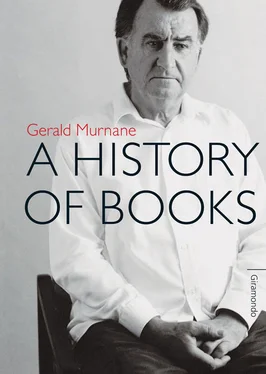As a teacher, he had been fanatical in urging his students to think of their fiction, of all fiction, as consisting of sentences. A sentence was, of course, a number of words or even a number of phrases or clauses, but he preached to his students that the sentence was the unit that yielded the most amount of meaning in proportion to its extent. If a student in class claimed to admire a piece of fiction or even a short passage of fiction, he would ask that student to find the sentence that most caused the admiration to arise. Anyone claiming to be puzzled or annoyed by a passage of fiction was urged by him to find the sentence that had first brought on the puzzlement or the annoyance. Much of his own commentary during classes consisted of his pointing out sentences that he admired or sentences that he found faulty. At least once each year, he told each class an anecdote that he had remembered from a memoir of James Joyce. Someone had praised to Joyce a recent novel. Joyce had asked why the novel was so impressive. The answer came back that the style was splendid, the subject powerful…Joyce would not listen to such talk. If a book of prose fiction was impressive, the actual prose should have impressed itself on the reader’s mind so that he could afterwards quote sentence after sentence.
The teacher who set such store by sentences, whenever he visualised as the last fifty metres of a mighty horse-race his looking for the piece of fiction that had most impressed him, regretted that he heard so little in his mind. If the images mentioned in a recent paragraph were few enough, the memories of sentences or phrases were fewer by far. He would have rejoiced if he could have witnessed a contest of sentences alone: if he could have repeated aloud to himself even a short sentence from each of the leading pieces of fiction so as to have had in his mind as the race came to an end only such visual images as arose from the remembered sentences. But he seldom recalled a sentence. The blurred and overlapping visual images took over his mind.
During the first few years after the man, whatever his name was, had ceased to be a teacher of fiction writing, he remembered some of the images mentioned in the previous few paragraphs of this piece of fiction: the images that had arisen in his mind whenever he had watched the details of an impossible horse-race in his mind. In later years, the man found himself remembering many fewer images than he might have expected to remember. In one of those years, the man began to understand that his failing more and more to remember details connected with more than three thousand pieces of fiction might itself be imagined as the finish of a horse-race.
The race just mentioned would be the last of all such races to be decided in the mind of the man, whatever his name was. The finish of the race would be very different from the finishes of the races that had been run in his mind at the end of most of his sixteen years as a teacher of fiction writing. In those earlier races, a closely bunched field had approached the winning post with first one and then another likely winner appearing. The last part of this last race would more resemble the last part of a long-distance steeplechase, when all but two or three entrants had dropped far behind. The entrants in the race would be every one of the more than three thousand pieces of fiction that the man had read and assessed while he was a teacher of fiction writing. No, the entrants would be every detail that the man might conceivably have remembered in connection with any of the more than three thousand pieces of fiction that he had read during sixteen years of his life. And the finish of this last race might itself last for a year at least, which would be in keeping with the duration of the whole race, which had already been in progress for more than five years before it came to the attention of the man in whose mind it was being run.
The man could take his time over this race; could even forget about the existence of the race for days or weeks on end. The less he thought about the race, the fewer contestants might appear in his mind when he next looked out for them.
At the fictional time when this piece of fiction began, the man, whoever he was, had been aware for more than two years that this last race, this race of races, was being decided in his mind. He was especially careful not to interfere with the fair running of the race. He wanted to give no help to any of the entrants, of which a dozen or more were in his view when he first became aware that they were, in fact, entrants in the most decisive of races. Whenever he looked at the progress of the race, which was only once in every few weeks, perhaps, he merely took note of which entrants were at the front of the field and then turned his attention to other matters, which is to say that every few weeks he asked himself what details he could still call to mind from all the pieces of fiction that he had read during his sixteen years as a teacher. Having asked this question of himself, he waited during an interval of a minute or two and observed the while what occurred in his mind.
The man thought it would have been unfair of him to give any encouragement to any of the struggling leaders in the race. And so he took care to do nothing that might help to fix in his mind one or another image arising from one or another piece of fiction and might therefore help to unfix one or another image arising from some other piece of fiction. But even though he tried to do no more than observe, his many years as an observer of actual horse-races made it impossible for him not to try to predict the actual winner. He had sat in so many grandstands at so many racecourses and had foreseen the eventual winner in each of so many closely contested races that he could not keep himself from trying to predict the winner of the race in his mind.
At the time when this piece of fiction began, no more than half-a-dozen contenders were in sight, and several of these were dropping back. The man who observed from time to time the progress of these stayers towards the finish line was surprised whenever he asked himself why these few and not some of countless other images were still in his view. The man could not remember the experience of reading for the first time any of the words and sentences that had first caused any of these images to arise in his mind. This failure to remember suggested to the man that he had never expected any of the images to remain in his mind long after countless other images no longer appeared in his mind.
A young Australian man is drinking in a bar in East Africa. He finds himself staring more and more often at two young women of striking appearance, even while his African drinking mate warns him to take no notice of the Somali prostitutes.
A young woman sits in a small boat in the shallows of a lake on a summer morning. The rest of her group are on a sandbar nearby. Among the group are a man who loves the woman and a man she hates. The two men are friends. The young woman is ill from the beer that she drank on the previous night in the company of the two men. At a certain moment while she tries to recall the details of the previous night, the young woman leans over the side of the boat and vomits into the lake.
A young girl comes home from school and finds, as on most other afternoons, that her mother has spent the day in her room smoking, drinking coffee and entertaining delusions.
Late on a summer evening in the 1940s, a girl of twelve or thirteen years tries to explain herself to her mother. A few minutes before, the girl had been playing cricket in the backyard with some boys from the neighbourhood. The girl had often played cricket with the boys. She was known as a tomboy and was innocent of sexual knowledge. During the latest game, she had chased the ball into a shed. The eldest boy had followed her. He had taken out his erect penis and had tried to undo her clothes. The girl’s mother, who might well have been spying on the cricketers for some time previously, had come into the shed. Later, when the girl tried to explain herself, she had seen that her mother thought her partly to blame, even complicit.
Читать дальше












